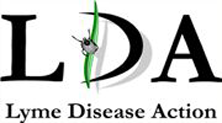![]()
26th November 2007
Contact: Stephanie Woodcock on 01326 375419 and 07833 623713
or Katy Weston on 07789 435822
MPs meet with Lyme disease charity to discuss what can be done to help Lyme patients left out in the cold by the NHS.
MPs are meeting on November 27th with representatives of Lyme Disease Action (LDA) to discuss the way forward for sufferers of Lyme disease, the puzzling and debilitating tick-borne disease. The meeting will be chaired by Julia Goldsworthy MP who tabled a recent Early Day Motion urging the
government to take action on this issue (1). The motion was signed by 80 MPs many of whom have constituents suffering from this little known but potentially devastating disease. LDA is hoping that MPs will help them press for clinical guidelines to be developed to assist doctors in diagnosis –
currently the subject of heated debate. Patients without a proper diagnosis could be missing out on necessary treatment, a practice that LDA states must cease. LDA are also seeking help in getting the government to provide much more public information on how to avoid infection. Since treatment for
this disease is currently under-developed, avoidance remains by far the best strategy for bringing down the rising toll of case numbers (2).
Lyme disease is a serious public health issue around which there has been much controversy in recent years. Lyme disease is caused by the bite of an infected tick; it is a bacterial infection that can be treated by antibiotics if caught early (3). However it can be difficult to diagnose and
current testing techniques are unreliable (4). This can leave many sufferers either misdiagnosed or undiagnosed, and therefore they do not get the necessary treatment. If the disease is left untreated or under-treated, it can often develop into chronic ill-health with varied and sometimes severe
symptoms (5). Many sufferers are left housebound or bed bound with little quality of life and no effective treatment from the NHS. It is a problem on the increase and global warming may be a key factor in the increased prevalence of the tick (2).
The medical controversy centres on the treatment of chronic Lyme disease. Lyme sceptic doctors believe that persistent infection after an initial course of antibiotics does not occur. However Lyme specialists in this country and the US see many patients for whom this is not the case and
where severe infection persists and requires long term antibiotic therapy. There is sound scientific as well as anecdotal evidence to support this view (6). Lyme Disease Action hears of many cases where patients have made a full recovery with long-term antibiotic treatment following years of
misdiagnosis.
The meeting with MPs is the first step in finding a way forward for patients suffering from this misunderstood and life destroying disease.
Note to Editors:
(1) Full text of the recent EDM: “That this House acknowledges that Lyme disease, also known as Lyme borreliosis, is a serious and potentially chronic disease which is becoming more widespread across the United Kingdom; notes the growing body of evidence which suggests patients with
this condition are frequently subject to misdiagnosis and under-treatment; is concerned the disease appears to be under-reported and inadequately investigated; calls upon the Government to make Lyme borreliosis ‘notifiable’ as a first step to tackling the disease.”
(2) Ticks and the diseases they carry are becoming increasingly widespread in the United Kingdom. Official figures for numbers of laboratory-confirmed cases of Lyme disease in England and Wales were 292 in 2003, 500 in 2004, 595 in 2005 and 768 recorded cases in 2006. The Health Protection
Agency acknowledges that these numbers do not equate to actual numbers of cases, which they estimate could be up to 3000 per annum. Lyme Disease Action has evidence that even these figures may be an underestimate.
(3) Cases of Lyme disease with a mild, uncomplicated primary infection, if treated in time, have a good prognosis. The majority of these people return to good health.
(4) The current diagnostic procedure often includes an over-reliance on whether or not a person was at risk of a tick bite whereas this risk is just one factor amongst many that should be considered. Added to this, the current laboratory tests for Lyme disease are often inconclusive. The
availability of doctors and consultants with expert knowledge of how to recognise and treat Lyme disease and associated tick-borne disease is currently inadequate. Lyme Disease Action has heard many accounts from patients of being given incorrect information. Abstracts of 84 peer-reviewed papers on
“Seronegativity in Lyme borreliosis and Other Spirochetal Infections” can be found at the following website: http://www.lymeinfo.net/medical/LDSeronegativity.pdf
(5) Some cases of Lyme disease, especially those that are undiagnosed or untreated or under-treated may progress to develop the disease in a more chronic and severe form. Symptoms typically shown in chronic cases include: extreme tiredness, muscle pain, muscle weakness, joint pain, upset
digestive system, headache and involvement of the nervous system, including the brain.
(6) Abstracts of 67 peer-reviewed papers on ‘Relapse/Persistence of Lyme disease despite antibiotic therapy’ can be found at the following website: http://www.lymeinfo.net/medical/LDPersist.pdf
(7) Spokespeople are available. LDA Press office: Stephanie Woodcock on 01326 375419 and 07833 623713 or Katy Weston on 07789 435822
lobby@nulllymediseaseaction.org.uk
(8) Lyme Disease Action – Striving for prevention and treatment of Lyme Disease and associated tick-borne diseases. https://www.lymediseaseaction.org.uk
(9) Lyme Disease Action is a registered charity No. 1100448.

 Printer Friendly
Printer Friendly